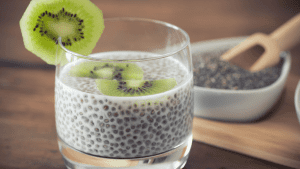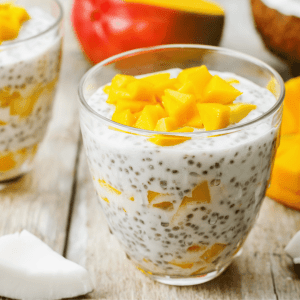Chia seeds have been gaining popularity as a superfood in recent years due to their numerous health benefits. They contain nutrients like fiber, protein, omega-3 fatty acids, and antioxidants. Chia seeds are also low in calories, making them a great addition to a healthy diet. In this article, we will explore the many benefits of chia seeds and how they can improve your overall health.
What are Chia Seeds?
Chia seeds come from the plant Salvia hispanica, which is native to Mexico and Guatemala. They are small, black, or white seeds rich in nutrients and have a nutty flavor. Chia seeds were a staple food of the Aztecs and Mayans and were used for their medicinal properties.

Benefits of Chia Seeds
1. Rich in Nutrients
Chia seeds are a powerhouse of nutrition, packed with various beneficial nutrients [1]. They are an excellent source of fiber, protein, omega-3 fatty acids, calcium, and antioxidants [2].
In fact, just one ounce (28 grams) of chia seeds contains 11 grams of fiber, 4 grams of protein, and 5 grams of omega-3 fatty acids. Fiber is important for digestive health and can help regulate blood sugar levels, while protein is essential for building and repairing tissues in the body.
Omega-3 fatty acids reduce inflammation, lowering the risk of chronic diseases like heart disease and arthritis. Calcium is important for maintaining strong bones and teeth, and antioxidants help protect the body against damage from harmful molecules called free radicals.
Chia seeds are also a great addition to a vegan or vegetarian diet, providing plant-based protein sources, omega-3 fatty acids, and calcium.
2. Weight Loss
If you want to lose weight, chia seeds may be a helpful addition to your diet. Their high fiber and protein content can help you feel full and satisfied, reducing the urge to overeat and potentially aiding in weight loss. [3]
Fiber is particularly beneficial for weight loss because it takes up space in the stomach and slows down the emptying of the stomach, which can help you feel fuller for longer periods. Chia seeds are an excellent source of fiber, with a one-ounce serving (about two tablespoons) providing around 11 grams of fiber.
In addition to fiber, chia seeds are also a good source of protein, which can further contribute to feelings of fullness and help you maintain muscle mass while losing weight.
3. Blood Sugar Control
In addition to their benefits for weight loss, chia seeds may also play a role in regulating blood sugar levels. The high fiber content of chia seeds can slow down the absorption of sugar into the bloodstream, preventing spikes in blood sugar levels.[4]
When we eat foods high in carbohydrates, our body converts them into sugar (glucose) and releases them into the bloodstream. This can cause a rapid increase in blood sugar levels, which can harm people with diabetes or other blood sugar disorders. However, the fiber in chia seeds can help slow down glucose absorption, preventing these spikes in blood sugar levels.
In addition to fiber, chia seeds also contain alpha-linolenic acid (ALA), an omega-3 fatty acid shown to improve insulin sensitivity and reduce inflammation [5]. This may further contribute to the blood sugar-regulating effects of chia seeds.
4. Digestive Health
Chia seeds can also promote digestive health due to their high fiber content. Fiber is an essential nutrient that is important in maintaining digestive health [6]. Chia seeds are a great source of soluble and insoluble fiber, which can help keep the digestive system healthy and prevent digestive problems.
Soluble fiber absorbs water in the digestive tract, forming a gel-like substance that helps slow down the digestion of food. This can help regulate blood sugar levels and make you feel fuller for longer. Insoluble fiber, on the other hand, helps move food through the digestive system and promotes regular bowel movements. This can prevent constipation and other digestive problems.
One of the unique properties of chia seeds is their ability to absorb water and expand in the stomach. This can help promote feelings of fullness and reduce overeating. The gel-like substance that forms when chia seeds are soaked in water can also help soothe the digestive system and reduce inflammation.
5. Heart Health
Heart disease is a leading cause of death worldwide, and reducing the risk of developing heart disease is crucial for overall health. Chia seeds can benefit from a heart-healthy diet due to their high omega-3 fatty acid content [7]. Omega-3 fatty acids are essential fats that play an important role in maintaining good health, and they have been shown to have numerous benefits for the heart.
Research has found that omega-3 fatty acids can help reduce inflammation throughout the body, including in the blood vessels, which can help lower the risk of heart disease. Inflammation can cause damage to the blood vessels and increase the risk of plaque buildup, leading to heart attacks and strokes. By reducing inflammation, omega-3 fatty acids can help keep the blood vessels healthy and reduce the risk of developing heart disease.
6. May Improve Hair Health
While chia seeds are rich in nutrients like amino acids, antioxidants, vitamins, and minerals such as copper, zinc, and iron, there is currently no clinical research to support the claim that they can delay graying hair. Some people believe that copper in chia seeds may combat unwanted gray hairs, but no scientific evidence exists. However, incorporating chia seeds into your diet can provide many health benefits. Their antioxidants may help protect against oxidative stress, which can damage the melanin-producing cells that affect hair color.
How to Incorporate Chia Seeds into Your Diet
Chia seeds are versatile and can be added to a variety of dishes. Here are some ideas:
- Smoothies – add a tablespoon of chia seeds to your favorite smoothie to boost nutrients.
- Oatmeal – mix in a tablespoon of chia seeds with your oatmeal for added fiber and protein.
- Yogurt – sprinkle chia seeds on top of your yogurt for a crunchy texture.
- Baked Goods – chia seeds can be added to baked goods like muffins and bread for nutrition.
- Chia Pudding – mix chia seeds with your favorite milk and sweetener for a tasty and nutritious pudding.

Is Chia Seed Safe To Use– Side Effects?
Chia seeds are generally considered safe to consume for most people. However, some individuals may experience side effects when consuming chia seeds in large amounts or if they are allergic to them.
One common side effect of consuming chia seeds is digestive discomfort, such as bloating, gas, and stomach cramps. This is often due to the high fiber content of chia seeds, which can cause digestive distress if consumed in excess or if the body is not used to it.
Additionally, chia seeds may interact with certain medications, such as blood thinners, and may lower blood pressure in some individuals. It is important to consult with a healthcare provider before adding chia seeds to your diet, especially if you have any underlying health conditions or are taking medications.
Lastly, individuals allergic to sesame or mustard seeds may also be allergic to chia seeds, as they belong to the same plant family. If you experience any allergic reactions, such as hives, swelling, or difficulty breathing, after consuming chia seeds, seek medical attention immediately.
Overall, chia seeds are safe for most people to consume in moderation. It is important to listen to your body and adjust your intake accordingly to avoid potential side effects.
How Much Chia Seed Per Day?
The recommended dosage of chia seeds is about 1-2 tablespoons per day. This is equivalent to approximately 20-40 grams per day, which provides a good balance of nutrients without overloading your system with excessive fiber or omega-3 fatty acids.
Consuming too many chia seeds may lead to digestive discomforts, such as bloating, gas, and stomach cramps. Additionally, chia seeds may interact with certain medications, such as blood thinners, and may lower blood pressure in some individuals. It is important to consult with a healthcare provider before adding chia seeds to your diet, especially if you have any underlying health conditions or are taking medications.
Frequently Asked Questions
Q. Are chia seeds good for you?
Chia seeds are a highly nutritious addition to any diet. They are packed with fiber, offering numerous health benefits, such as improved heart health, reduced cholesterol levels, and better digestive health. In addition to this, chia seeds have the potential to promote weight loss and decrease the risk of developing diabetes or heart disease. This is because the high fiber content in chia seeds helps slow digestion, making you feel fuller for longer periods. Incorporating chia seeds into your daily routine is a simple and effective way to boost your overall health and well-being.
Q. Are chia seeds good for you while pregnant?
Chia seeds can benefit a pregnant woman’s diet due to their high nutrient content. They are a great source of fiber, protein, omega-3 fatty acids, calcium, and antioxidants. However, it is important to note that there is limited research on the effects of chia seeds during pregnancy, so it is best to consume them in moderation.
Chia seeds are generally considered safe to eat during pregnancy in moderate amounts. Still, it is always best to consult a healthcare provider before adding any new food to your diet. Pregnant women should aim to consume a well-balanced diet that includes a variety of nutrient-dense foods, including fruits, vegetables, whole grains, lean proteins, and healthy fats.
Q. Are chia seeds bad for diverticulitis?
There is no clear evidence to suggest that chia seeds are bad for diverticulitis, but it is recommended to consume them with caution. Chia seeds are a high-fiber food, and for individuals with diverticulitis, consuming too much fiber may cause discomfort or worsen symptoms. It is important to consult a healthcare professional and consider individual dietary needs before consuming chia seeds or other high-fiber foods if you have diverticulitis.
Q. Can chia seeds reduce belly fat?
Chia seeds are effective in reducing belly fat, as studies have shown that their consumption can lead to a decrease in visceral adipose tissue. This can be attributed to chia seeds’ high fiber and protein content, which helps increase feelings of fullness and reduce overall calorie intake.
Conclusion
In conclusion, chia seeds are a nutrient-dense superfood with numerous health benefits. They are easy to incorporate into your diet and can help with weight loss, blood sugar control, digestive health, and heart health. If you have yet to try chia seeds, it’s time to try them.
- Related Articles: Other Herbal Remedies
